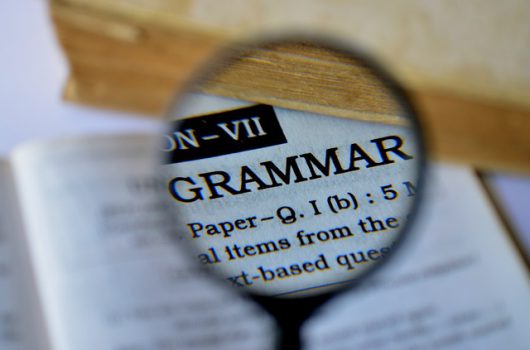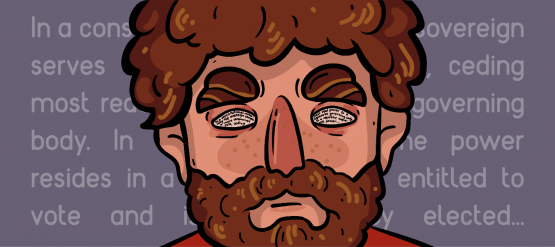No More Mistakes With This Grammar Cheat Sheet

The cold, hard truth is that the autocorrect feature on your phone and the spelling and grammar checks in your word processing software aren’t enough to guarantee error-free writing. And text speak never cuts it in academic and professional settings or in serious personal circumstances.
Even if your class or major is unrelated to English, strong writing skills are crucial in any endeavor or career. Use this grammar cheat sheet to check yourself, and make a note of any weak spots you have or things you tend to forget or mix up. Keep a physical or digital sticky note on your computer, and glance at it any time you sit down to write.
Homophones
Its, It’s
- The bird is flapping its wings. (correct; possession)
- It’s a beautiful day to watch birds. (correct; contraction of it + is)
Their, There, They’re
- Their party was a bit loud. (correct; possession)
- I’m glad I wasn’t there. (correct; adverb)
- They’re going to get in trouble one of these days. (correct; contraction of they + are)
Then, Than
- First, put on your socks; then, put on your shoes. (correct; sense of time/order)
- You are taller than I realized. (correct; comparison)
Yore, Your, You’re
- The movie special effects of yore used no CGI. (correct; time in the past)
- Your taste in movies is a bit odd. (correct; possession)
- You’re really into those black-and-white films. (correct; contraction of you + are)
Word Usage
Bring, Take
- Please bring me my phone. (correct; from another location to your current location)
- I always take my phone to class. (correct; from your current location to another location)
Everyday, Every Day
- My workouts are an everyday thing. (correct; adjective only)
- I work out every day. (correct; adverb phrase)
I, Me, Myself
- I am the queen. (correct; subject)
- Bill and I are friends. (correct; compound subject)
- Give me my crown. (correct; object)
- The fight for the throne is between Bill and me. (correct; compound object)
- I call myself Queen of the Universe. (correct; reflexive verb)
- It was just him and myself. (incorrect)
- It was just him and me. (correct)
Lay, Lie
- Lay your head on the pillow and rest. (correct; transitive verb)
- Lie here and rest. (correct; intransitive verb)
Loose, Lose
- I must have lost weight, because my pants are loose. (correct; adjective)
- I would like to lose a bit more weight. (correct; verb)
Nor, Or
- He is neither a man nor a child. (correct; negative)
- That is either a small rat or a large mouse. (correct; positive)
That, Which
- I read the book that you recommended. (correct; specifies one book of many)
- I read the book, which happened to be very expensive. (correct; refers specifically to a certain book)
Weather, Whether
- Have you checked the weather report today? (correct)
- I don’t know whether I should take an umbrella or not. (correct)
Who, Whom
- Who are you? (correct)
- Do you know who he is? (correct)
- Who are you talking to? (incorrect but very common)
- Whom are you talking to? (correct)
Punctuation
Apostrophe (‘)
- she’s (correct; contraction of she + is)
- wouldn’t (correct; contraction of would + not)
- Bob’s book (correct; the book of Bob)
- the Olsens’ home (correct; the home of the Olsens)
- the member’s choice (correct; the choice of a certain member)
- the members’ choice (correct; the choice of more than one member)
- I visited the Olsen’s. (incorrect; apostrophe not used in plurals)
- I visited the Olsens. (correct)
Colon (:)
- My mother told me to buy milk, eggs, and bread. (correct; language flows and does not need the colon)
- My mother told me to buy just the essentials: milk, eggs, and bread. (correct; stop before list requires the colon)
- I told her one thing: I need money. (correct; phrase or clause after colon explains phrase or clause before colon)
Comma (,)
- I’m with him, he’s with her. (incorrect; comma splice between two complete sentences)
- I’m with him, and he’s with her. (correct; conjunction added)
- I’m with him; he’s with her. (correct; alternative if you do not add a conjunction; see “Semicolon”)
Hyphen (-)
- I hate three eyed monsters. (incorrect depending on intended meaning; sounds like I hate eyed monsters and there are three of them)
- I hate three-eyed monsters. (correct; I hate monsters with three eyes)
- Remembering these grammar rules takes a bit of self-discipline. (correct)
Semicolon (;)
- Let’s go to the movies, it’s not too late. (incorrect; comma splice)
- Let’s go to the movies; it’s not too late. (correct; semicolon separates two sentences)
Of course, this cheat sheet can’t cover everything you need to know about English. Massive style guides are published for professional copywriter and editors. But hopefully, this helpful article will steer you in the right direction.









